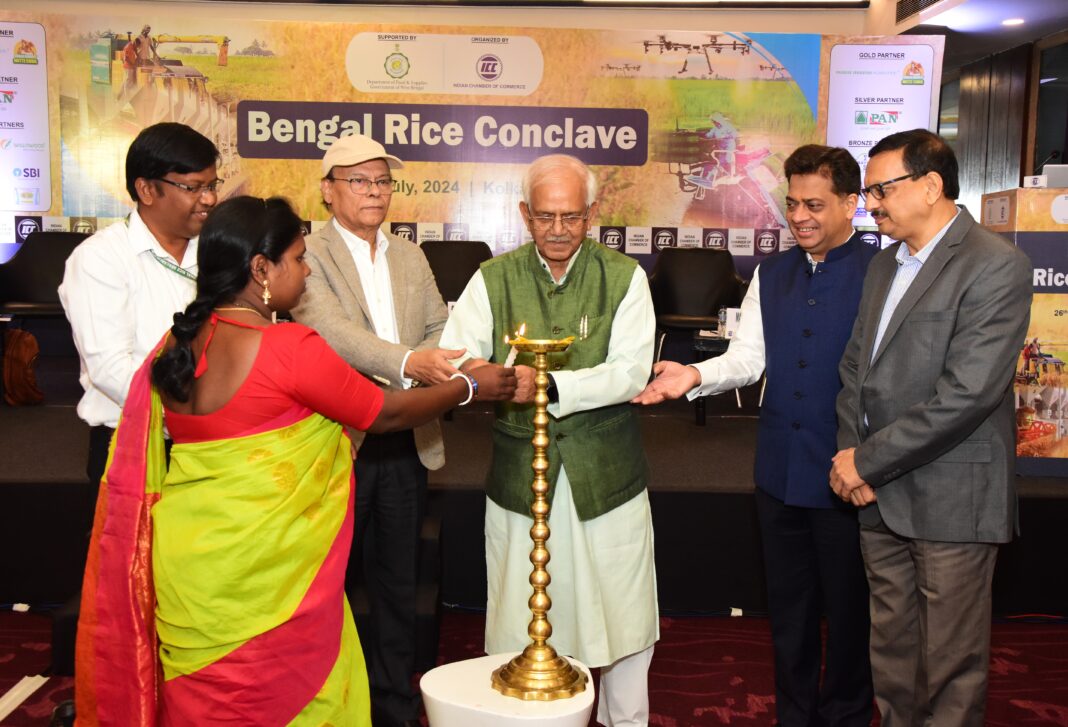Indian Chamber of Commerce organised Bengal Rice Conclave 2024 on Friday, 26th July 2024 at The Park. The event witnessed three panel discussions on ‘Best Practice on Farm Management for Quality Rice Production, Seeds, Crop Protection, Micro Irrigation and Climate issues and Technology;’ ‘Sustainable Post-Harvest Practices, Advanced Rice Milling Technologies & Machinery, Efficiency and Productivity in Milling, Modern Rice Storage Techniques;’ and ‘Market Linkage, Financial Schemes and Export Possibilities. Distinguished dignitaries included Shri Sobhandeb Chattopadhyay, Hon’ble Minister-In-Charge, Department of Agriculture, Government of West Bengal; Shri Arup Roy, Hon’ble Minister, Department of Food Processing Industries and Horticulture, Government of West Bengal; Shri Pradip Kumar Mazumdar, Hon’ble Minister-in-Charge, Department of Panchayats & Rural Development and Cooperation, Government of West Bengal; Mr. Ashutosh Mondal, Director, Department of Agriculture, Government of West Bengal; Prof. Swapan Dutta, Former, DDG-Crops, ICAR, Ministry of Agriculture, Government of India; Dr. Amresh Kumar Nayak, Director, National Rice Research Institute (NRRI), Cuttack; and Mr. Shrikant Goenka, Chairman, Agriculture and Food Processing Committee, Indian Chamber of Commerce, enriched the event with their insightful speeches.
Speaking on the recent perspectives on rice research and development in West Bengal, Shri Sobhandeb Chattopadhyay, Hon’ble Minister-In-Charge, Department of Agriculture, Government of West Bengal, said, “Rice has been a staple in Bengal for centuries, integral to cultural and religious events. West Bengal, the ‘rice bowl of India,’ contributes 14% of the nation’s rice, featuring rich biodiversity. Over 12 years, significant advances in production and cultivator livelihoods have been made, yet challenges persist, such as climate risks, inadequate seeds, resource depletion, soil health, labour issues and limited mechanisation. Climate change has intensified droughts, floods and cyclones, impacting rice and other crops. The State Government has introduced initiatives, including climate-resilient seeds, crop insurance and direct-seeded rice (DSR). Research focuses on stress-tolerant, hybrid and bio-fortified rice varieties. Efforts to promote indigenous aromatic varieties have expanded cultivation significantly. Diverse folk rice varieties contribute to cultural dishes and health security, with research targeting diabetic-friendly and nutri-rich rice. Organic farming and sustainable practices like DSR and AWD are promoted to conserve resources and improve soil health. Many farmers have faced severe challenges in the past, often resulting in suicides due to issues like loans, famines and droughts. Today, significant improvements have been made. Farmers receive ₹10,000 annually, split into two payments of ₹5,000 each, while those with smaller landholdings receive ₹4,000 annually. Insurance premiums are now fully covered and if a farmer dies before the age of 60, their family receives ₹2 lakh immediately. Farmers over 60 are also provided with pensions. Families of farmers in West Bengal, in particular, are now in a better financial state. Our research centres are dedicated to advancing the agricultural sector, including the development of rice with lower sugar content. We are also exploring alternative cultivation options, such as millet production. Rice remains a staple food across several Indian states, including Bengal, Karnataka, Kerala, Andhra Pradesh, Bihar, Odisha, Assam and Jharkhand. We are optimistic that our ongoing efforts will help bridge existing gaps and further enhance the sector’s resilience.”
Emphasising on West Bengal being the leading producer of rice, Shri Arup Roy, Hon’ble Minister, Department of Food Processing Industries and Horticulture, Government of West Bengal, said, “We all are aware of the fact that we produce diverse varieties of rice and we can easily talk about any of the products. Today, Bengal is manufacturing a lot of quality products. In 2011, Govind Bhog and Tulaipanji were very famous in Barddhaman and North Bengal respectively. Back then, we did not have permission to export rice but after a lot of discussion and my travels to Delhi, we finally got access and permission to export rice to other countries, which grew popular with time. Earlier, the market price of Tulaipanji was around ₹50 per kg, which has now risen to ₹130. The state government has helped farmers in multiple ways to elevate their lifestyle in every aspect. The scenarios have completely changed; today they are no longer surviving in poverty. They have faced a lot of difficulties earlier, taking loans for cultivation and struggling to sell their produce in the market. From that condition, the West Bengal government has helped them tremendously to change their conditions. The West Bengal government has introduced a lot of policies and strategies for their betterment. We are organising the Food Festival at Netaji Indoor Stadium on 9th, 10th and 11th August. I am expecting that we will turn up as the leading producer of other crops alongside rice and potatoes. The government is always by the side to help farmers in every way possible.”
Representing the chashas and farmers first, Shri Pradip Kumar Mazumdar, Hon’ble Minister-in-Charge, Department of Panchayats & Rural Development and Cooperation, Government of West Bengal, said, “I often worry about the myriad stakeholders involved in agricultural crops, particularly rice. We discuss ways to enhance the product and improve productivity, yet we face a potential global food shortage due to a growing population. New factors are emerging, such as China reducing rice acreage to conserve water and importing from less affluent countries. These issues affect farmers’ earnings significantly. Despite attempts to undermine the performance of our marginal and small farmers, West Bengal, which has a large proportion of such farmers, relies heavily on rice cultivation. Ensuring that farmers get fair realisation for their produce is crucial. When Mamata Banerjee took office in 2011, she prioritised ensuring that farmers received fair prices, acknowledging their dependence on agricultural income. The Green Revolution of the 1960s, led by Dr. Swaminathan, transformed India into a food-surplus nation, allowing us to feed 1.4 billion people. However, the focus on increasing productivity also led to problems in the agricultural sector. Our approach needs to shift from merely increasing production to managing demand effectively. Since 2012, we have been diversifying rice varieties in West Bengal to help farmers get better prices at the farm gate. This initiative has enabled them to receive up to 40-45% more for certain varieties, despite lower yields. West Bengal is a major rice-producing state that grows summer rice and must balance self-sufficiency with avoiding surplus production. Our challenge is to minimise water usage and reduce methane emissions. This is not just environmentally beneficial but also economically prudent and supportive of farmers’ livelihoods. Additionally, jute is a significant crop in West Bengal. We need to support farmers by promoting varieties with better realisation and offering marketing support and business linkages to keep them informed and profitable.”
Prof. Swapan Dutta, Former, DDG-Crops, ICAR, Ministry of Agriculture, Government of India, said, “India’s agriculture sector is thriving, with significant exports. We’re the leading rice-exporting country, earning 46 billion USD from agriculture exports, which underscores the sector’s strength. Specifically for Bengal, this conclave is crucial. We’re known for our rice and fish, and Bengal farmers are often happier despite not earning as much as those in Punjab and Haryana due to different cultural aspects. Bengal’s rainfall is generally adequate but there’s a need to adopt micro-irrigation for better productivity. Recent years have seen a reduction in Bengal’s rice production but this can be addressed through new technology, innovations and micro-irrigation. West Bengal is also incentivising certain rice varieties for their traditional value. Despite the reduction, Bengal farmers are smartly diversifying crops for better earnings. With the right milling systems and technological adoption, Bengal can lead in both productivity and quality. The government’s procurement policies ensure a robust demand for rice, supporting both private and industrial sectors. India must remain self-sufficient in rice production, and Bengal plays a crucial role in this. Bengal’s traditional rice variety, Jira, fetches higher prices than Basmati due to its quality and market strategy. This shows the potential for quality rice production and the importance of effective marketing strategies.”
Dr. Amresh Kumar Nayak, Director, National Rice Research Institute (NRRI), Cuttack, said, “National Rice Research Institution (NRRI) has a rich history dating back to 1942 when a severe famine struck Odisha, Jharkhand, Bangladesh and West Bengal, killing over 20 lakh people due to erratic rainfall and disease. In response, during World War II, the British government established the institute to ensure food security in the region. Since then, it has developed rice varieties and technologies, playing a crucial role during the Green Revolution by increasing grain production, notably boosting rice output by 10 million tons. Rice, being highly resilient and adaptable to diverse ecologies, remains vital for future food security and climate resilience. However, challenges such as producing more with fewer resources and protecting crops from climate change persist. Additionally, linking rice farming with the market for profitability requires significant research and investment.”
Mr. Shrikant Goenka, Chairman, Agriculture and Food Processing Committee, Indian Chamber of Commerce, said, “Rice stands as a cornerstone in India’s agricultural landscape, intricately woven into its cultural and culinary fabric. West Bengal, a major rice producer, is projected to produce approximately 15.75 million tonnes this year. However, we face significant challenges, particularly in water management. Traditional flood irrigation methods are no longer sustainable; therefore, adopting modern technologies such as micro irrigation is crucial for increasing yields. The System of Rice Intensification (SRI) method, which maintains paddy fields in a moist rather than inundated state, has demonstrated a 30% increase in rice yields while optimizing water, land, labor, and capital. The Bengal Rice Conclave provides an excellent platform to discuss and promote these innovative practices. Continuous research and development in organic farming, advancements in rice genetics and biodiversity conservation for resilience and yield are commendable. Technologies like Krishi Rasta for rapid salt testing and the Government of West Bengal’s initiatives in electronic paddy procurement, seedling hubs and promoting environmental sustainability align with our vision. Our focus should be on strengthening collaboration between farmers, technology developers, educators and other stakeholders to help West Bengal reclaim its position as the leading rice producer in the country.”



